Young here we are – The Mayors and Presidents Meeting at EUROPARC Conference
The role of the young generation
As every year during the EUROPARC Conference, our president Ignace Schops organised a session with all the member, talking about the central topic of the conference and how to develop it. The reunion was open with a general introduction made by Cairngorms National Park President Peter Argyle, talking about our role as human being in the nature and how our little gestures are influencing the planet. What is about Biodiversity? We as human are related to 0,01% biomass of the planet, which is why we need to act in a sustainable way.
“If we people start to think that we can change it will happen”
When we talk about sustainability we need to think that every topic has to be related, starting from the economy, tourism, lifestyle. It’s the moment that we need to pass from a linea to a circular economy, based in a inclusive way of living instead of a separate one.
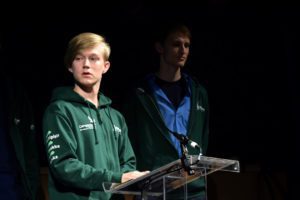
Youth representative presenting the Youth Manifesto
In the panel discussion were present different examples:
-
Cairngorms National Park
In the park, that was also the one that hosted the conference this year, the president said:
“Our park is a park for everybody”
They developt different programmes:
- Junior ranger project that runs for years and the young are fundamental for the maintenance of the park itself;
- Travel grant program was the funding is provided by the school to permit that everybody can reach the park;
- Panoramas, that helps to give a sense of belonging to young people;
- Educational resource, producing every year new papers and tool that can be used as a school material;
-
Youth + Representative
The aim of this Manifesto that was presented during the conference:
“Co-design a sustainable future. Now.”
Is a call for change made by young people, that have worked in the production of this Manifesto, explaining the action that they already had done as 2 workshop, one in Finland, one in Scotland and their volunteer to have a young empowerment, living, learning and working connected with what they love: nature.
-
Parc Naturelle Regional
“We belive in, and love our territory”
That’s why the park is involved in many activities:
- Different project like the building of houses for birds and bees with the local community
- Recycling: from wooden pales, young people made fitness courtyard and object to use in parks, such as benches
- Environmental protection: creating educational programmes with the primary school to present at the final of the year in the “environmental week”
- Live together: a group was sharing the opportunity to restore a “petange” and renovate an entire pavilion
Parco Nazionale delle Prealpi Giulie
“Is never enough to do, we can always do a lot for our park”
The involvement of young people was always the key for the different program developed:
- A guide from the park go to 4 schools during the year, giving lesson to the children (till 14 years old), talking about the different aspect of the park
- Since 2007 is formed the Europarc Junior Ranger (from 14 to 18 years old)
- Young board council: is formed by young people from 16 to 30 years old, that are actively part of the park decision. The directorate gives them a budget to spend on projects that they have to run out and develop, after the approvement of the general council.
- Youth at the top: is a camp based on a specific theme and this year was the first one about “Climate Change”
So as we can see from these examples all over Europe there is this volunteer to involve the young generation in the decisional process.
Alfred Toepfer Scholarship winners 2018
Alfred Toepfer Scholarship Winners 2018 (From left to right) Ignace Schops, Agné Jasinavičiūtė, Lászlo Patkó, Baiba Ralle and Andreas Holz at EUROPARC Conference, Scotland.
Every year, the Alfred Toepfer Natural Heritage Scholarships (ATS) supports the work of young conservationist in protected areas across Europe. EUROPARC and the Alfred Toepfer Stiftung award 3 scholarships to young professionals willing to make study trips in European Protected Areas. The Award ceremony took place at EUROPARC Conference, in the Cairngorms National Park (Scotland), get to know the winners of the 2018 edition!
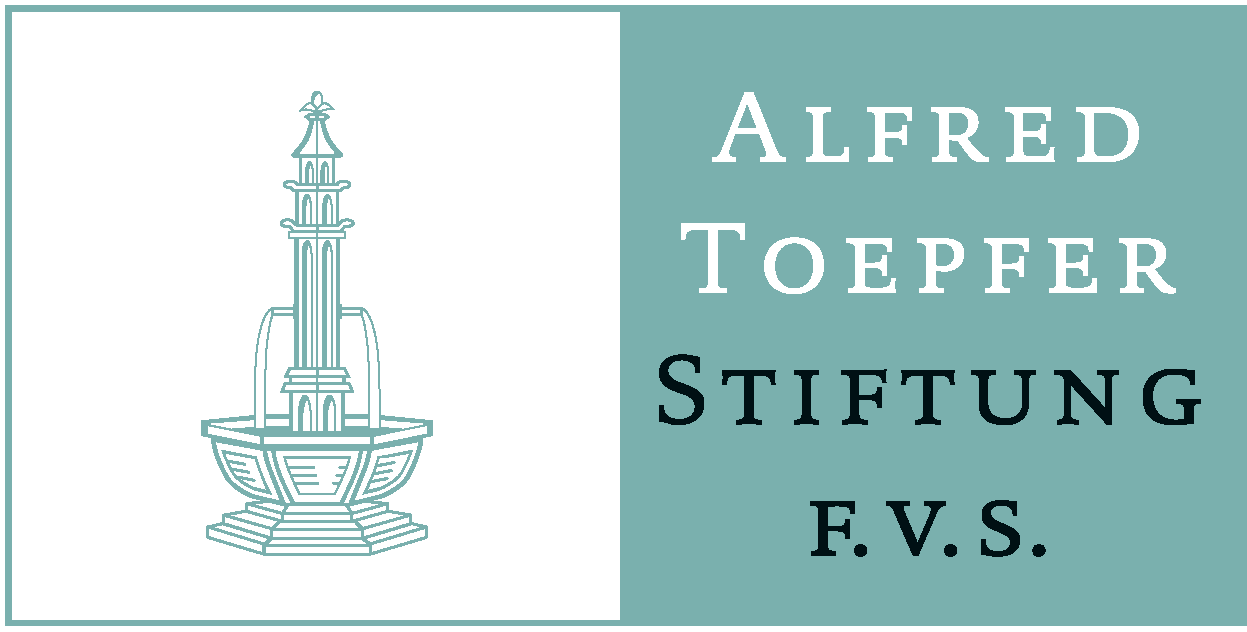
Agnė Jasinavičiūtė, Lithuania
Area of work: sustainable development and management of protected areas and awareness-raising of landscape in practice.
Agnė Jasinavičiūtė is currently working as Chief Officer of the Landscape Protection Division at the State Service for Protected Areas under the Ministry of Environment of Lithuania. Her main duties includes the coordination of landscape monitoring in protected areas, assessment of the status of the values, preparation of strategic planning documents and implementation for landscape and biodiversity conservation and management. She is a Lecturer and also Ph.D. student in Vilnius University of Physical Geography field.
During her study trips, Agnė will focus on various landscape perception and policy tools for management in different categories of protected areas which are under pressure from various drivers of change such as urbanisation, infrastructure development, intensive recreation, climate change etc. She will also analyse how these large-scale protected areas are managed and monitored. Besides, Agnė is interested in methods of raising awareness and landscape interpretation of the protected areas.
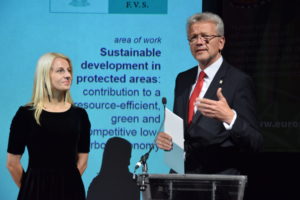
Agne Jasinaviciute and Andreas Holz, representative of Alfred Toepfer Stiftung, during the Awards Ceremony.
Agnė selected several National parks and Areas of Outstanding Natural Beauty in United Kingdom, which have the oldest and deepest traditions of the landscape protection – the Cairngorms National Park and Scenic Area in Scotland, South Downs and the Peak District National Park, together with High Weald and Shropshire Hills Area of Outstanding Natural Beauty in England. Also Montagne de Reims and Caps et Marais d’Opale Regional Natural Parks in the North of France.
By meeting with protected areas managers and stakeholders, she expects to prepare recommendations to improve landscape monitoring strategy and implement a new approach to the protected landscape.
Baiba Ralle, Latvia
Baiba Ralle is currently working as a nature education specialist/PR manager at Nature Conservation Agency, Latvia. Her everyday work is mostly connected with Kemeri National Park. Baiba will broaden her knowledge about communication of protected areas (strategic planning of public relations), collect new tools, best practices, outstanding ideas of society involvement and learn new methods of nature education and interpretation.
She is interested in new methods of educating park visitors and local groups, connecting them with nature, giving them the feeling that specially protected areas have been made for them, are actually serving them and should thus be regarded as elements of national identity, something own and therefore guarded as a gemstone.
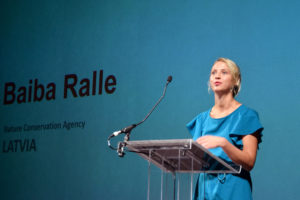
Baiba Ralle presenting her project proposal during the Awards Ceremony.
Baiba will be visiting protected areas with a great popularity as tourism destinations at European level – Dolomiti Bellunesi National Park in Italy, Saxon Switzerland National Park in Germany, Triglav National Park in Slovenia, Central Bohemian Uplands in Czech Republic, and will learn with the Conservation Volunteers from the United Kingdom.
The experience and knowledge will help Baiba and her administration boost the potential of Kemeri National Park and other Latvian Protected Areas in promoting nature and culture heritage conservation both for local communities through the new projects offering new connections; as well as national/international audiences through the new PR and marketing activities. Experience will be step towards effective improvement of public awareness and sense of ownership of our common natural and cultural heritage, which is the very basis for sustainability of any conservation efforts.
László Patkó, Hungary
László Patkó is working for WWF Hungary as the Large Carnivore Programme Leader since 2018. Previously, he was employed by the International Council for Game and Wildlife Conservation (CIC). László has graduated from the Szent István University where he studied nature conservation and wildlife management. He studied non-invasive carnivore monitoring methods during his PhD years at the Institute for Wildlife Conservation, Gödöllő. Having spent his early career in research, hunting and nature conservation led him to WWF Hungary where he manages the Euro Large Carnivore LIFE project. This project aims to bridge the gap among different stakeholder groups, like conservation experts, hunters and livestock keepers for a more efficient co-existence with large carnivores.
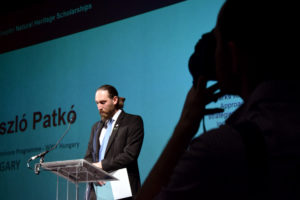
László Patkó on stage at the Alfred Toepfer Awards Ceremony 2018.
László’s aim is to visit Alpi Marittime Natural Park in Italy where he can learn more about local involvement. In Malá Fatra and Cerova vrchovina (Slovakia) he would like to learn about carnivore monitoring methods, which are carried out jointly with park rangers and hunters In Romania, at the Cheile Bicazului Hasmas National Park he is going to learn about the long standing coexistence from the locals. As his final destination, he will share his experience in his home country at the Bükk National Park and at his Alma Mater, the Szent István University.
“Only the mountain has lived long enough to listen objectively to the howl of the wolf.” (by Aldo Leopold)
Memorandum of Understanding – ENOS and EUROPARC
Francois Beauchard and Ignace Schops after the signature of the Memorandum of Understanding.
The European Network of Outdoor Sports & EUROPARC Federation
ENOS was established as a not for profit organisation in 2013 and, two years later, it was first introduced to EUROPARC members during the General Assembly. Since then regular exchanges have been maintained between both associations with some directorate staff attending ENOS bi-annual Conferences and members from ENOS attending ours. Last year, ENOS Chairman François Beauchard and the Commissioner Antoine Le Bellec presented a case study in the workshop on “Sports in nature. Is it fit for purpose?” held at the EUROPARC Conference 2017 in Portugal. This year at EUROPARC Conference 2018 ENOS has been in charge of organising the workshop “Outdoor Sports in Protected Areas: a tool for social inclusion”.

On September 18th 2018, during the annual Conference celebrated at Cairngorms National Park in Scotland, EUROPARC Federation and the European Network of Outdoor Sports signed a Memorandum of Understanding looking forward to strengthening their relationship. Furthermore, the objectives of this agreement are to mobilize ENOS and EUROPARC networks to promote the practice of responsible outdoor sports in Protected Areas, minimize their environmental impact and to work for the local implementation of the ENOS Charter that EUROPARC fully endorses.
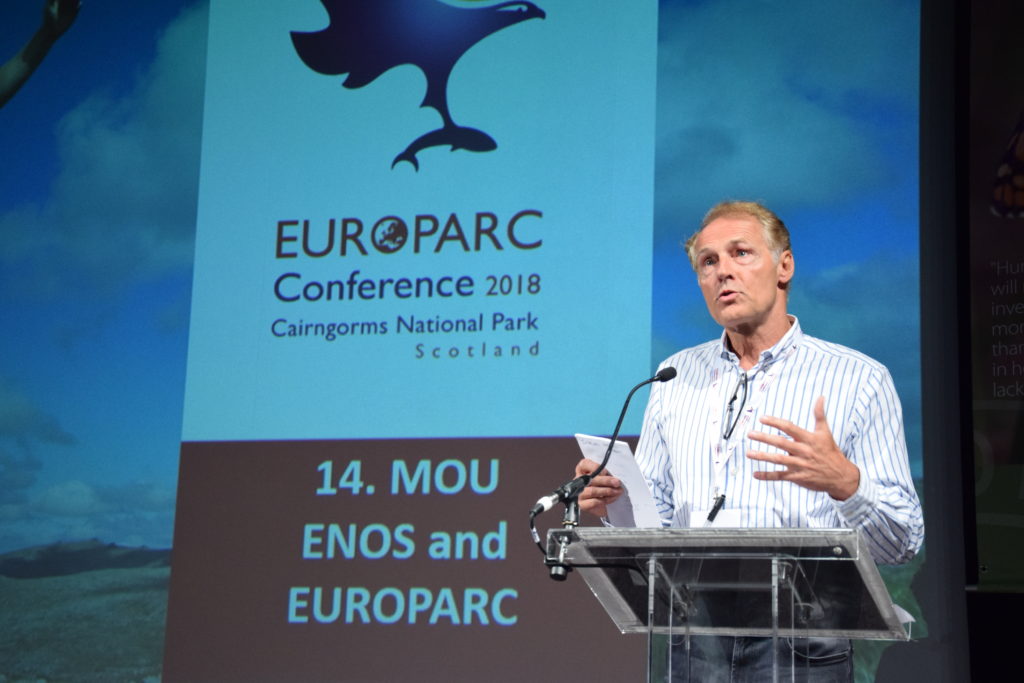
Francois Beauchard at EUROPARC Conference 2018.
After the signature of this agreement, a mixed Task Force composed of members from ENOS and EUROPARC to progress will be appointed and an online consultation to all members from both associations will be conducted to identify their priority lines of work for 2019. Furthermore, both parties agree, within their available human and financial resources, to work together on the implementation of the following priority activities:
1. GOOD CONDUCT Promote a Charter/Code of Good Conduct in Protected Areas aimed at outdoor sports practitioners;
2. HEALTH Communicate the benefits of practicing outdoor sports for global health and well-being;
3. TRAIL DESIGN Give guidance in order to improve trails design that meet the objective of offering; healthy trails for all segments of society, especially elders, children and people with difficulties, whilst minimising environmental impacts and practitioners conflicts;
4. EVENTS Provide advice and expertise on outdoor sports massive events organisation in Protected Areas to minimise negative impact;
5. CARRYING/HOSTING CAPACITY Develop the concept, share case studies, in order to provide both Protected Areas managers and Outdoor Sport Events organisers with data and tools to better estimate the carrying/hosting capacity of a Protected Area;
6. CAPACITY BUILDING Work and make available tools to build capacity on Outdoor sports in Protected Areas and related issues;
7. OTHER key activities of mutual interest and concern that are jointly defined and agreed by both Parties.
WTTC Tourism for Tomorrow Awards 2019 – Applications are open!
The World Travel & Tourism Council (WTTC) calls on Travel & Tourism organisations to showcase their achievements by entering in the Tourism for Tomorrow Awards 2019.
The Tourism for Tomorrow Awards recognise best practice in sustainable tourism within the industry globally, based upon the principles of environmentally friendly operations; support for the protection of cultural and natural heritage; and direct benefits to the social and economic well-being of local people in travel destinations around the world.
This year applicants can enter in the following five categories: Social Impact, Destination Stewardship, Climate Action, Changemakers, and Investing in People.
- The Social Impact Award recognises an organisation working to improve the people and places where it operates.
- The Destination Stewardship Award celebrates organisations that have rejuvenated a place, maintained and developed its authenticity, brought stakeholders together and created something new and attractive.
- The Climate Action Award seeks to recognise innovative actions through either behaviour change of guests and employees, policy changes or the introduction of technology, to reduce the scale and impacts of climate change.
- The Investing in People Award recognises an organisation demonstrating leadership in becoming an exciting, attractive and equitable employer in the sector.
- The Changemakers Award is a newly introduced category which recognises an organisation which has made real, positive and impactful change in a specific area of focus, which will change each year. In 2019, the focus will be on fighting the illegal wildlife trade through sustainable tourism.
The 2019 Finalists will be announced in January 2019 and the winners will be announced during next year’s WTTC Global Summit, which will take place in Seville, Spain, 3-4 April 2019.
All information available at www.wttc.org/tourism-for-tomorrow-awards.
Applications are now open and the closing date is 14 November 2018.To apply please visit http://wttc.org/T4TAwards
Celebrating 15 years of Tourism for Tomorrow
Since the beginning of the Tourism for Tomorrow Awards under WTTC, there have been approximately 2,450 applicants from over 50 countries, 186 finalists, and 62 winners who have demonstrated economic, environmental, and social & cultural benefits from best practices in sustainable tourism.

Fiona Jeffery OBE, Founder and Chairman of the international water aid charity Just a Drop and Chairman of the WTTC Tourism for Tomorrow Awards, said: “15 years of the Tourism for Tomorrow Awards is a significant milestone. These awards are regarded as the “Oscars” of the Sustainable Tourism Sector setting the highest standards of achievement in the world. They provide an important benchmark for social, environmental and economic best practise.
Fundamentally they reflect and promote a code of conduct and set of values that the travel and tourism industry should strive and be proud to uphold and have sit in its operational DNA. As our sector continues to expand and evolve, it’s vital we recognise and support innovative businesses who demonstrate sustainable practises and ensure we protect our communities and planet for future generations. I look forward to marking a special year.”
About the World Travel & Tourims Council:
WTTC is the body which represents the Travel & Tourism private sector globally. Members consist of CEOs of the world’s T&T companies, destinations, and industry organisations engaging with Travel & Tourism. WTTC has a history of 25 years of research to quantify the economic impact of T&T in 185 countries. Travel & Tourism is a key driver for investment and economic growth globally. The sector contributes US$8.3 trillion or 10.4% of global GDP, and accounts for 313 million jobs or one in ten of all jobs on the planet.
For over 25 years, WTTC has been the voice of this industry globally. Members are the Chairs, Presidents and Chief Executives of the world’s leading, private sector Travel & Tourism businesses, who bring specialist knowledge to guide government policy and decision-making and raise awareness of the importance of the sector.
WTTC’s annual Global Summit brings together over 800 delegates to discuss the opportunities, challenges and issues facing the industry, while its Tourism for Tomorrow Awards recognise the industry’s power to be a positive force in sustainability. Next year’s WTTC Global Summit will take place in Seville, Spain on 3-4 April 2019.